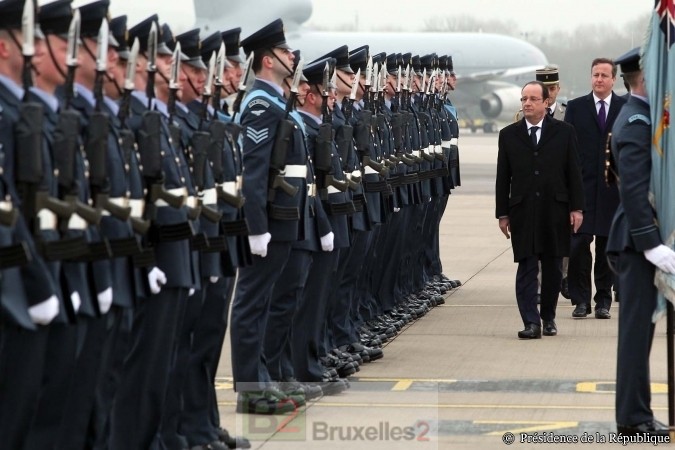The economic crisis is affecting defense budgets. Parliament sounds the alarm
(BRUSSELS2) What impact is the economic crisis having on defense budgets? The question haunts all the military and industrialists of the continent. Without any exception. Because no country seems to be spared by postponements or cuts in investments, closing of barracks, downsizing when it is not the redundancy or the end of contracts of several hundred soldiers, civilians or contract workers, without forgetting the repercussions for employment in industry. The question is also causing concern in the European Parliament, which is due to adopt an own-initiative report, prepared by the Polish member of the Civic Platform, Krzysztof Lisek, and which will be adopted in committee on November 17 (in plenary in December). Parliament is concerned unprecedented cuts to defense budgets, too often implemented piecemeal, with little or no coordination with EU or NATO partners”. These uncoordinated budget cuts risk leading to the total loss of certain military capabilities in Europe ».
A reminder of the rules
Parliament is also alarmed at " the current disproportionate reliance on the United States in defense-related matters The US contributes 75% of NATO's total defense spending, he said. Member States collectively spend around €200 billion a year on defence, “ barely a third of the US defense budget ". It therefore calls on all Member States of the Union to " fully assume their share of responsibility for the peace and security of Europe, its neighborhood and the world as a whole ". Each state is committed in the Treaty and in the conclusions of the European Council in particular, to strengthen their military capabilities ».
Only way: change method, work more together
For MEPs, the only " way forward " based on " increased cooperation ". They propose implementing a new approach: better coordination of defense planning, which includes the harmonization of military requirements, the pooling and sharing of certain functions and resources, improved cooperation in research and technology development, industrial collaboration and consolidation, optimization of the procurement process and the removal of market barriers. The European Union having in this matter “tools and mechanisms that can help Member States achieve this goal”, in particular in identifying areas that could benefit from increased European funds”.
A European Defense Semester
The Parliament asks the States to carry out “systematic reviews of security and defense according to common criteria and timetable”. But not only. He wants to go further and suggests making a " regular exercise linked to budgetary procedures, like a "European semester" of security and defense reviews” in the image of what is done in economic and social matters. In the minds of parliamentarians, it is the European Defense Agency which would have a leading role in this exercise.
The European Defense Agency responsible for defining the useful and the useless
As a first step, Member States would submit their draft national security and defense reviews "for opinion" to the Agency, which will assess them in the light of the capability development plan, the plans of other Member States and relevant NATO initiatives; believes that in the very short term, the EDA could also play an important role in defining capability priorities and identifying unnecessary duplication of Member States' capabilities ».
Remove the superfluous
The next step could go through a process of mutual consultation of Member States with a view to harmonizing their military requirements ". Parliament believes that Member States should take advantage of this process to also assess existing overcapacities, especially with regard to material and human resources that are less operationally prioritized”.
Pooling is no longer a choice
Parliament shows itself firmly convinced that the pooling and sharing of capacities is no longer an option, but a necessity ". He believes that several sectors can be at the heart of this pooling: “ strategic transport, logistics support, maintenance, space capabilities, medical support, education and training ". Just as the States have an interest in seeking together how to solve the deficits in capabilities: aerial refueling, maritime surveillance, unmanned aerial vehicles (UAV), CBRN (chemical, biological, radiological and nuclear) protection, the fight against improvised explosive devices, satellite communication, intelligence, surveillance and reconnaissance (ISR) sensors and platforms, and combat and information systems.
Several models exist for this cooperation, details the report which does not content itself with generalities but gives some concrete examples which could/should be put into cooperation:
- joint ownership (like Galileo, for example space capabilities, drones, strategic transport aircraft);
- the pooling of resources held nationally (like the EATC, for example transport helicopters, maritime patrol aircraft and means of evacuation by sea);
- the pooling of the acquisition of goods (like the A400M);
- sharing of roles and tasks (eg military academies, test and evaluation facilities and pilot training facilities, CBRN units, air ambulances).
Pass alliances
Cooperation can go through bilateral alliances. Like the Franco-British agreement, MEPs could call for the launch of other cooperation projects, particularly among the countries of the Visegrad group (Poland, Hungary, Czech Republic and Slovakia). But, more generally, States must exploit the potential offered by the Agency in terms of administrative and legal support and entrust it with the management of their cooperation initiatives ».
Focus on research and technology (R&T)
Parliamentarians believe that Member States should " absolutely exclude R&T from their budget cuts ". They consider that a number of projects (CBRN protection, unmanned aircraft or boats, maritime surveillance, cyber defence, fight against IEDs, etc.) have both civilian and military aspects and would like the European Defense Agency and the Commission European are working together.
Find new funding
The objective is to be able to make more use of European funds, by channeling them more towards defense projects. Moreover, it is necessary " find new forms of European funding in the next multiannual financial framework. The military Erasmus program should thus be able to be financed by the European budget like its civilian big brother.
A headquarters is needed
Finally, this is not the first time that parliamentarians have said this. But they drive, again, the nail by focusing. " The creation of a European Union Headquarters would not only enhance the Union's ability to support international peace and security, but would also result in long-term savings for national budgets through the pooling and to sharing ". And the report to call the High Representative " explore existing legal options for establishing a permanent European military planning and command capability of this type ».
Download the draft report: B2 docs



Comments closed.